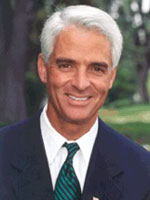A comprehensive energy bill has passed the Florida legislature, and now goes to the governor for an expected signature.
This story from the Orlando (FL) Sun-Sentinel says the measure has provisions specifically addressing renewable energy in the state:
 The bill, which addresses Gov. Charlie Crist’s call for policies that combat global warming, is made up of 112 sections that could dramatically increase the state’s investment in renewable energy. The House passed the energy bill unanimously Tuesday and the Senate passed the House bill by a vote of 39 to1 Wednesday.
The bill, which addresses Gov. Charlie Crist’s call for policies that combat global warming, is made up of 112 sections that could dramatically increase the state’s investment in renewable energy. The House passed the energy bill unanimously Tuesday and the Senate passed the House bill by a vote of 39 to1 Wednesday.
Among the changes proposed, the bill would require state buildings to meet specific “green energy” standards. That’s expected to cost more during construction but save the state money in the long run by increasing energy efficiency.
The bill would allow state regulators to set goals for individual utilities on how much renewable energy they produce and to fine utilities that don’t meet the goals and reward them if they do. Regulators would be required to consider the effect of utility customers’ rates when setting the goals.
Passage gained the praise of Crist:
“I want to thank Senate President Ken Pruitt, House Speaker Marco Rubio, Senator Burt Saunders and Representative Stan Mayfield for their leadership in securing Florida’s green energy future,” Governor Crist said. “Today’s vote signifies a commitment to protecting Florida’s natural beauty and stimulating our economy, as well as reducing our dependence on foreign sources of oil.”
The bill also assures accountability for the renewable energy with a state commission studying whether green fuels such as biodiesel, wind, and solar provide returns for the state’s investment in them.



 The development is focused on Mascoma’s single-step biochemical conversion of non-grain biomass into low-carbon alternative fuels to help address increasing energy demand. It ties in with another partnership
The development is focused on Mascoma’s single-step biochemical conversion of non-grain biomass into low-carbon alternative fuels to help address increasing energy demand. It ties in with another partnership 
 According to EPIC Director of Operations Robert White, “The blender pump program will provide incentives and support to gas station retailers who want the opportunity to offer blender pumps, raise awareness to consumers, and offer flex-fuel vehicle motorists more opportunities at the pump.”
According to EPIC Director of Operations Robert White, “The blender pump program will provide incentives and support to gas station retailers who want the opportunity to offer blender pumps, raise awareness to consumers, and offer flex-fuel vehicle motorists more opportunities at the pump.”  One of the main goals is to increase the state’s blender pump infrastructure by installing a minimum of 100 new blender pumps over the next year. There are currently nearly 20 blender pumps in the state. All blender pumps will be branded with the stylized “e” logo and the necessary precautionary pump labels.
One of the main goals is to increase the state’s blender pump infrastructure by installing a minimum of 100 new blender pumps over the next year. There are currently nearly 20 blender pumps in the state. All blender pumps will be branded with the stylized “e” logo and the necessary precautionary pump labels.  “Today, we celebrate the official start of the largest wind energy project to date in Nebraska,” Gov. [Dave] Heineman said at the groundbreaking. “I want to offer my thanks and appreciation to everyone involved with this project, which will more than double Nebraska’s wind power capacity.
“Today, we celebrate the official start of the largest wind energy project to date in Nebraska,” Gov. [Dave] Heineman said at the groundbreaking. “I want to offer my thanks and appreciation to everyone involved with this project, which will more than double Nebraska’s wind power capacity. Working with funding from the U.S. Department of Transportation, the National Biodiesel Board (NBB) is granting $1.2 million to the Donald Danforth Plant Science Center in St. Louis, Mo. for a three-year project to enhance oil production from soybeans.
Working with funding from the U.S. Department of Transportation, the National Biodiesel Board (NBB) is granting $1.2 million to the Donald Danforth Plant Science Center in St. Louis, Mo. for a three-year project to enhance oil production from soybeans. “This grant is yet another of the Danforth Center’s unique partnerships for supporting basic plant science research. In this case, the partnership will address the pressing needs for more efficient methods to produce fuels from renewable plant sources,” said Danforth Center President Dr. Roger N. Beachy. “We greatly appreciate the support of Senator Kit Bond and his staff in facilitating the relationship between the Danforth Center and the National Biodiesel Board in an effort to increase the oil feedstock for biodiesel production.”
“This grant is yet another of the Danforth Center’s unique partnerships for supporting basic plant science research. In this case, the partnership will address the pressing needs for more efficient methods to produce fuels from renewable plant sources,” said Danforth Center President Dr. Roger N. Beachy. “We greatly appreciate the support of Senator Kit Bond and his staff in facilitating the relationship between the Danforth Center and the National Biodiesel Board in an effort to increase the oil feedstock for biodiesel production.” “We are proud to support the Danforth Center as researchers there look for ways to get more bang for the buck from each soybean seed,” said NBB CEO Joe Jobe. “Increasing the oil feedstock supply is vital to the rapidly expanding biodiesel industry. Soybean oil is one of the primary feedstock sources used in the production of biodiesel, and we hope this research will increase the soy oil supply. Plus, whatever advances are made on beans will have a high likelihood of being transferred to other oilseed crops – other biodiesel sources.”
“We are proud to support the Danforth Center as researchers there look for ways to get more bang for the buck from each soybean seed,” said NBB CEO Joe Jobe. “Increasing the oil feedstock supply is vital to the rapidly expanding biodiesel industry. Soybean oil is one of the primary feedstock sources used in the production of biodiesel, and we hope this research will increase the soy oil supply. Plus, whatever advances are made on beans will have a high likelihood of being transferred to other oilseed crops – other biodiesel sources.”
 Updated with recorded video
Updated with recorded video
